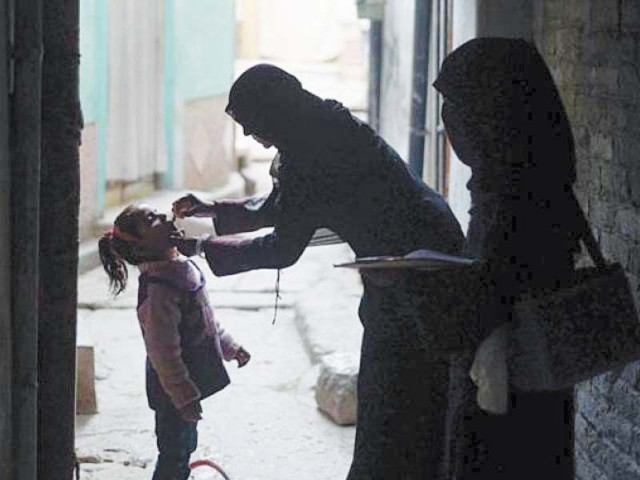Downtrodden: ‘Patriarchal expectations make LHWs suspicious, disgraced’
Research findings reveal problems facing lady health workers

LHWs are confronted with negative stereotypes among men, according to findings of the study on Sexual Harassment with Lady Health Workers at Office and Field. PHOTO: FILE
These were the findings of a research study undertaken by journalist Moniza Inam. She presented these findings at Hotel Mehran on Monday in collaboration with Workers Education and Research Organisation (Wero).
According to the findings of the study on 'Sexual Harassment with Lady Health Workers at Office and Field', LHWs are confronted with discrimination and negative stereotypes by men in the community and also face domestic violence at home. Besides, irregular salaries, uncertain job conditions, long working hours and too many traveling hours coupled with no clear job description are among the other issues that LHWs face on a regular basis.
Inam said that domestic violence at home goes unreported and can manifest itself in different forms, such as physical, sexual and emotional. Lauding the LHWs, however, she added that maternal and child mortality rates have decreased in the areas covered by the LHWs. According to her, the field is now a major employer of women in the non-agricultural formal sector in rural areas. She talked about how these women face violence because of irregular timings, travelling and during work and training. According to her findings, nearly 22 LHW polio workers have been killed in deliberate and orchestrated plots since 2012. She added that the widely shared sentiment of under-appreciation, low morale and motivation and difficulty to maintain a work-life balance often leads to divorce.
Recommendations
The researcher recommended that the government of Pakistan and Sindh should devise a new salaries structure commensurate with educational qualification.

The government should also conduct a widespread awareness campaign on the implementation mechanism of 'The Protection against Harassment of Women at Workplace Act, 2010', she said. The LHWs must only be assigned duties that were part of the original PC-1 of the Lady Health Workers Programme (that was an initiative of slain Prime Minister Benazir Bhutto in 1994), she added.
Inam urged that committees should be set up with female members in all the districts to monitor sexual harassment cases, which should look after investigation and decide appropriate action against perpetrators. Furthermore, the LHW unions in all the provinces should be strengthened, including the establishment of a network at the national level of all the 125,000 LHWs, of which around 22, 576 are in Sindh alone.
Socio-economic disparities
In another research study on 'Socio-economic impacts of delayed wages on lady health workers and their families', it was found that 68% of the households of LHW reported having a member with a major disease. According to the findings of Salman Kazi, an assistant professor at PAF-KIET, the average family income reported of LHWs was Rs23,682, with an average budget deficit reportedly standing at Rs5,885 per month, which leads to borrowing from local retailers. The borrowing is also done to pay utility bills and to meet educational and medical expenditures.
According to the findings, the children of one in every third household of LHWs do not go to school despite being of school-going age. Out of these, 87% are girls, which will increase the skill and education gap between genders in these families.
Patriarchy continues
In 63.3% of the households surveyed, men - sons or husbands of working age - do not earn anything, yet remain the masters of the households. Furthermore, 87% of the respondents reported having little to no control over their salaries, which leads to depression.
Published in The Express Tribune, February 1st, 2017.



















COMMENTS
Comments are moderated and generally will be posted if they are on-topic and not abusive.
For more information, please see our Comments FAQ